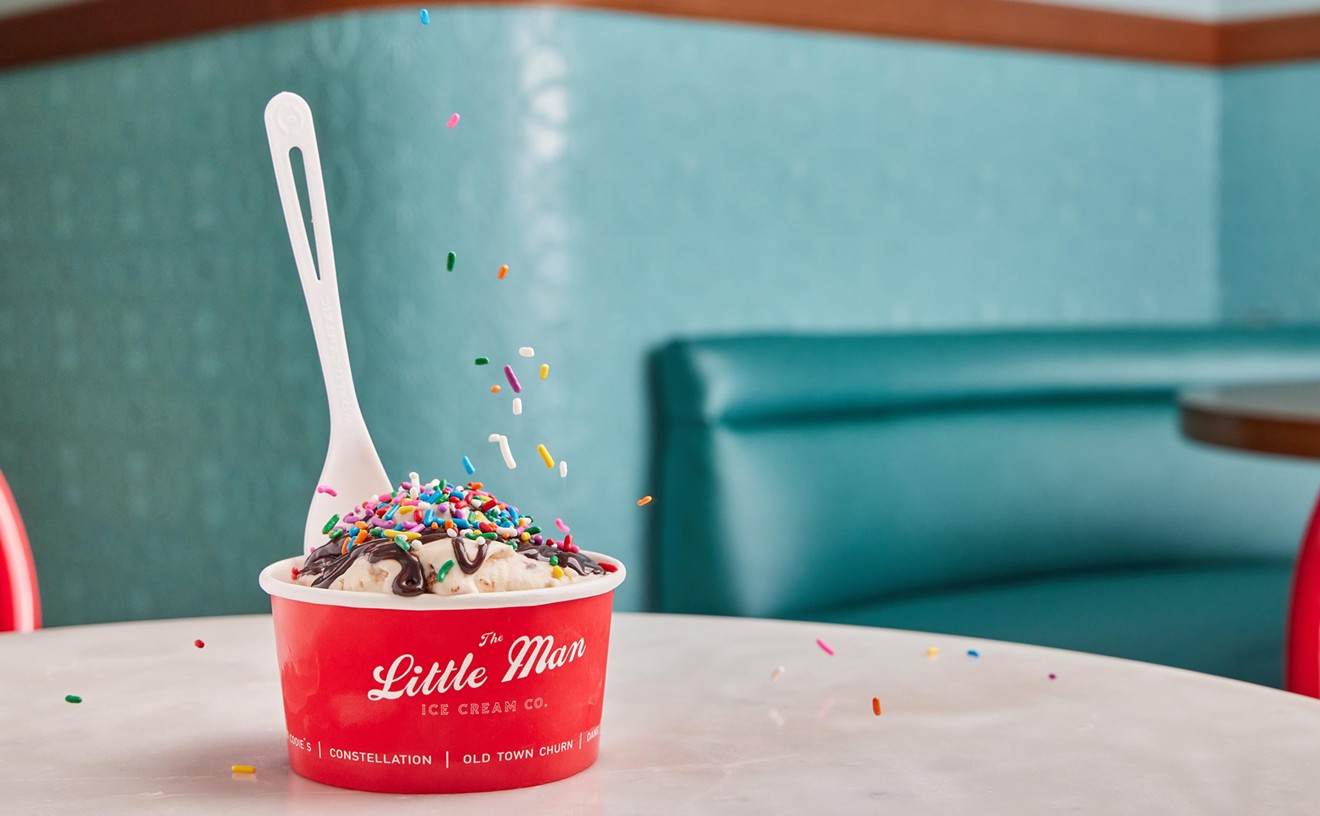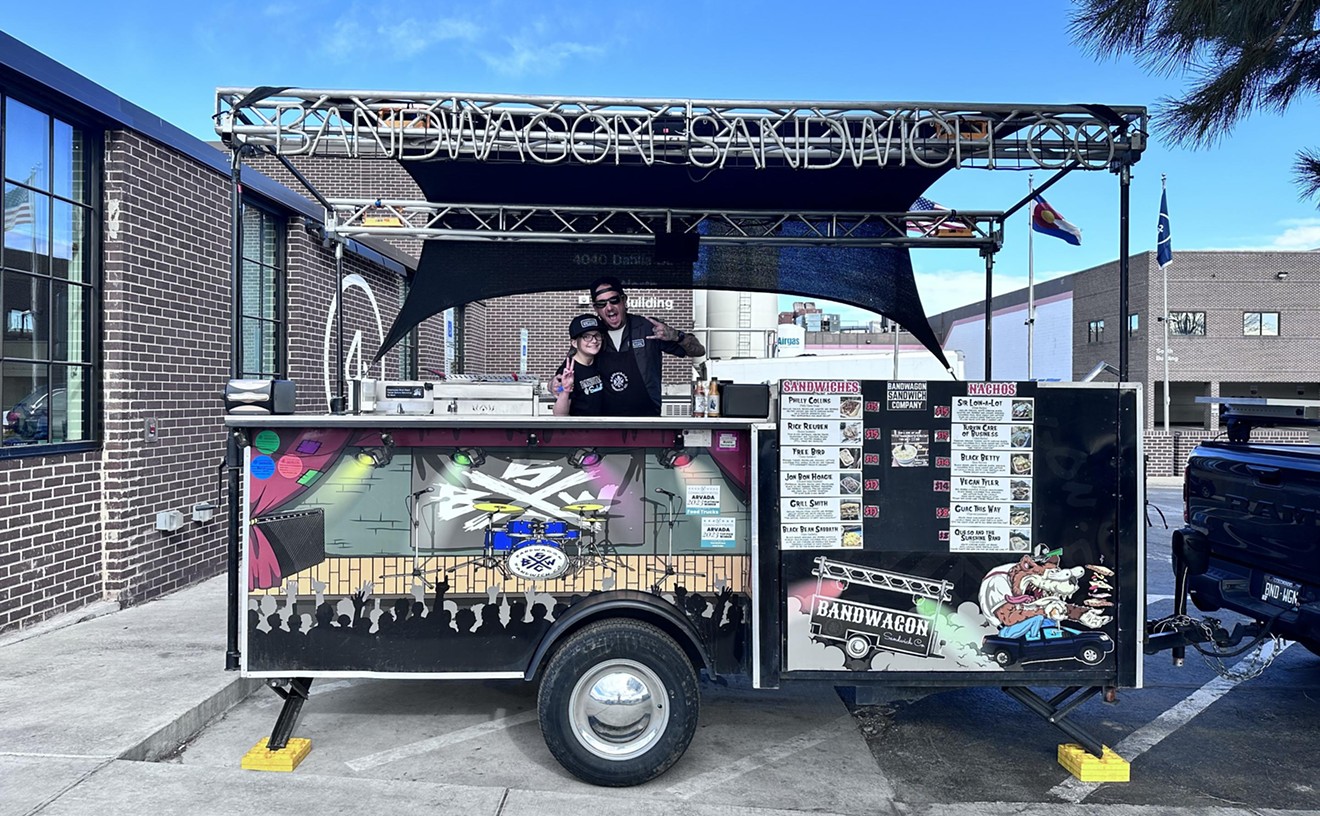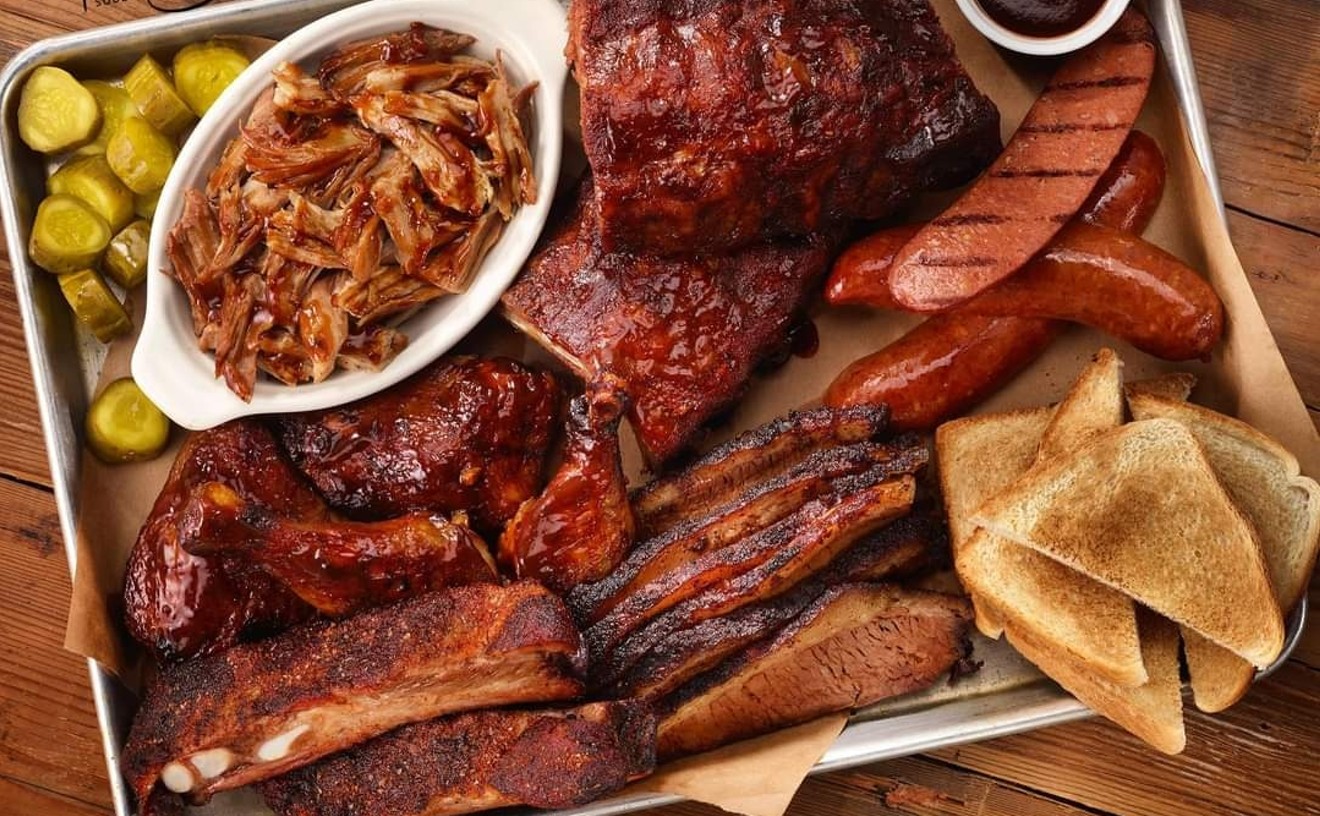Coming down from the mountains, I was eating tafelspitz with my fingers. I was scooping up spaetzle — sticky with gravy, dyed purple by the pickled cabbage it had snuggled up against on the plate — and shoveling it into my mouth. Like a caveman (or just another unprepared culinary day-tripper), I was lifting a slab of dripping top round to my mouth and tearing off bites with my teeth: Westfaelischer sauerbraten, the glory dish of Westphalia, one of the most recognizable in all of the German canon.
Laura was driving. My mom — in town for another lightning visit, having arrived at dawn as if air-dropped from some sort of blacked-out parental commando flight — was in the back. The two of them were talking about something; I had no idea what. I was oblivious to the conversation, the fruited plains, the purple mountain majesty all around me. Oblivious to everything but my impromptu, rolling lunch from Westfalen Hof, one of Colorado's oddest, most maddening and most unique restaurants.
A couple of years ago, I was in New York for an awards ceremony, dressed in my best suit, sweating like a sinner at confession among my food-writing brethren. I'd already knocked back a few cocktails and was feeling frisky, so to kill time, I picked a fight with a guy who, if I remember correctly, was one of the editors at New York magazine. There was just something about him that bugged me — an uppity sense of geographical superiority common to Manhattanites, that sense that all of history, all of culture, all of cuisine, began and ended on his little island.
Our conversation had started off pleasantly enough: I asked what he did, and he told me. He asked what I did, and I told him. And as I said "alternative newspaper" and "Denver, Colorado," I watched his eyes actually glaze over, his gaze flicking up over my shoulder to see if there was anyone more worthy within hollering distance. Really, it was that instant of dismissal that set me off. Followed by his boneheaded jokes about eating bulls' testicles and steaks seven nights a week.
Au contraire, I insisted, laughing it up and trying not to punch him in the throat. Why, Denver has long been a bastion of interesting, cutting-edge and ethnic cuisine.
"Rattlesnake?" he asked.
"Sushi," I countered. "One of the best in the country."
"No way," he scoffed. "I'm not eating sushi in a landlocked state."
"Well, then, you're an idiot."
Things went downhill from there.
Eventually, our argument devolved into a square-state-versus-Coastie pissing match. He insisted that New York was the center of the culinary universe. I told him there was nothing he could get in New York that I couldn't get in Denver (or close enough). And then we started going down the list: sushi, fresh abalone, dim sum, Korean, decent pizza, real Italian. He scored points with the classic Manhattan defense: really good Thai food and an ounce of California hydro, delivered, at four in the morning. I counterpunched with my neighborhood's strengths: authentic Shanghainese street food, Vietnamese breakfasts and a joint that offers Korean doughnuts and chicken soup, nothing else. He hit me with Mario Batali, and I told him that I'd see his Batali and raise him the former chef of the Grand Hotel in Florence. Bobby Flay? Screw you, we've got the guys (and girls) who used to cook Bobby's menus.
I challenged him to get on a plane and come out to Denver; he demurred. After that, we both were busy losing our respective categories and drinking away our sorrows. But right before we abandoned our little game, I mentioned one thing that Manhattan was never going to have: a view. "You know the last place I ate before getting on the airplane?" I'd asked. "On top of a mountain. Nine thousand feet and some of the best koeniginpastetchen I've ever had."
I was talking about Westfalen Hof, although by this point I'd had enough drinks that I was having difficulty pronouncing words like "Westfalen," "koeniginpastetchen" and "airplane." But I was serious. My first meal at Westfalen Hof had been that impressive (amazing koeniginpastetchen and bunter salatteller, perfect jägerschnitzel and beef roulade), good enough to carry me across half a continent and add a last kick to my ridiculous foodie slap fight.
It took me two years to get back — not from New York, but to Westfalen Hof, the restaurant that Edward and Patricia Gumieniak opened a few years back in the former Copperdale Inn outside of Golden. Two years to find the right excuse and an appetite for kartoffelpuffer and spaetzle strong enough to justify the drive, the expense and the downright difficulty of enjoying a meal there.
The place is a museum of kitsch, an Austro-German wonderland of Old World knickknackery complete with wooden carvings of fat little apple-cheeked chefs and mounted pictures of walled cities, old cooking implements repurposed as decor, plastic flowers and imported beer advertisements, all dusted and polished. Eating here is like mainlining shlock, like dining inside a cuckoo clock — one that smells faintly of beer and boiled cabbage and echoes with oompah music drifting down from hidden speakers.
But while some ethnic restaurants are warmed and softened by their hodgepodge collections of cultural artifacts, by their loving clutter of touchstones, Westfalen Hof is not. Here, there's a palpable sense of dislocation — of isolation, cabin fever and chilly severance. This isn't a charming little piece of Westphalia plunked down in the Colorado mountains. This is Westphalia, misplaced and longing to rejoin the fatherland.
The crowds are not crowds. They are hardy and loyal individuals — singles and deuces, mostly old, mostly regulars, people who've obviously gone out of their way to come here for the bratwurst and cabbage rolls. The dining room is quiet — the clink of silverware like ellipses on conversations long abandoned — and orderly, with white tablecloths and liner plates, coasters and serving ware. The decorum borders on oppressive. Patricia Gumieniak, who lives here with her family, does most of the serving, and I have never seen her smile. The only break in this quiet and cold, steely comfort comes from the Gumieniaks' four-year-old daughter, who pretty much has the run of the place — crawling under tables, showing off her toys, staring down strangers who refuse to play with her during lunch — and the moments when you glance through the big picture windows overlooking the Colorado Rockies and remember why they named this area Wonderview in the first place. All the suffocating decor, Teutonic strangeness and silence aside, the view on foggy afternoons or at sunset is absolutely breathtaking.
And then there's the food. On my most recent visit, stepping outside for a fresh breath of Colorado as a tonic against smothering, Germanic navel-gazing, I watched a full brigade of cooks — white-jacketed and aproned, bound up in full chefly regalia for a service that encompassed maybe a half-dozen tables — going in and out the kitchen door, dodging the violent affections of a beagle tied up on the sidewalk. They were carrying cases of meat, of produce, discussing (near as I could tell) prep schedules and the disposition of stock, chattering away in German, Russian — something guttural and Slavic, something with too many consonants by half.
Although there was a Help Wanted sign pinned to the restaurant's billboard out front, there were already as many cooks as there were customers. And beyond my usual urge to pitch in and help (an instinct that hasn't faded even after years away from the galley), I felt a weird kind of affection for these guys. Here they were, on top of a mountain in Colorado, stationed in one of those real, lost-outpost kinds of situations and obviously far from wherever they called home, going one-for-one with a virtually empty floor — yet cooking food that was uncompromisingly good, unstintingly traditional, as rich and laden with butter, flour, fat and cream as it was larded with history.
I went back inside, where my second hit of koeniginpastetchen — the dish whose memory I'd carried with me to the ballroom of that Manhattan hotel — was waiting. And it was as good, if not better, than I'd remembered: flaky pastry shells filled with a ragout of veal and earthy mushrooms in a Riesling sauce thickened with flour, jacked with veal-bone demi. To follow, there was a salad of pickled cabbage and carrots, kernels of corn in a cold cream sauce and a brilliant tomato soup, laced with sour cream and deep with a dozen competing yet complementary spices that made it taste like a smoky peat fire in a magical tomato forest.
We ate boiled pierogi that were ugly as sin but tasty as hell, their chewy skins giving way to onion-shot mashed potatoes within, and stroganoff that was decent — rich and thick and creamy, socked in with tender chunks of veal — but had been better the first time around, two years and hundreds of meals ago. My mother, craving a bit of history from the German side of the family, had gone straight for the sauerbraten (once horsemeat back in the Old Country, now top round, sliced and marinated for days in vinegar, juniper and clove, then braised, sweetened slightly with raisins or cookies or beet sugar) with cabbage and spaetzle. I'd opted for the tafelspitz — a special of boiled beef in gravy, comfort cuisine from an ox-eating people.
But the room was getting to me. The clouds had rolled in to choke off the view, and I felt trapped by someone else's memories, someone else's longing for home. I'd hoped that good food and a couple of long beers would cosh the rumblings of alien claustrophobia this place engendered, but nothing worked. I needed a cigarette, a change of scenery, an escape.
Asking to have the leftovers boxed up, we made a break for the door — Laura and I, with my mom in tow, trailed by the little girl who wanted to show us her doll, her new dress, whatever. We piled into the car and began making our way down the mountain. With every mile we covered, I felt better. More Coloradan. More grounded in my actual place rather than someone's glossy recollections of theirs. After a few miles, I started feeling hungry. And by the time we'd dropped a thousand feet in elevation, I was at the to-go boxes, eating with my fingers, wiping my chin on my sleeve — once more in love with a restaurant that I never really wanted to go back to.










